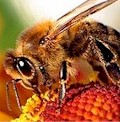Honey bees have fascinated man for hundreds of years. But more recently the importance of bees from an environmental perspective has come to the fore - and not without reason. Honey bees have two main roles. Firstly, as pollinators, and secondly as producers of honey (and other bee products).
The importance of the role of pollination cannot be overstated. Honey bees are responsible for the pollination of about 80% of all insect pollinated plants. Without them, these plants simply would not be pollinated, and food production would drastically fall as a direct result. Over 100 of our staple food crops rely on insects for pollination.
Second to the important role pollination plays, bees are more well-known for the honey they make. The bee will travel up to four miles from the location of his hive in search of flowers bearing nectar. Bees feed themselves, and additional nectar is collected into a second stomach.
Upon their return to the hive, this nectar is deposited into honeycombs and fanned to remove excess water. The removal of this water also helps to naturally preserve the honey for an extended period. This sticky golden substance is used as a primary food source for the whole colony. Of course, for us humans it is a great sugary tasting food additive. It may also be found in other products such as cosmetics and medicine.
Additional resources gathered from the honeybee include propolis, beeswax, and pollen.
Propolis is sort of a bee glue. It is used by the bees to seal cracks and perform their own maintenance within the hive.
Beeswax is a substance that worker bees excrete from the wax glands on their abdomen. Within the hive it is collected to create the honeycomb. For years, humans have been using this wax in candle-making. Today it can be found as an ingredient in many popular lotions and creams.
Pollen is collected by the bees into pollen baskets. Because of its protein content, it is used as a nutritional food for the brood. We humans have found it to be best used as a health supplement.
In an effort to maintain all the benefits provided by the bee, a movement has begun that is in great support of the smaller bee farmer. You don't have to breed bees on a massive scale to make a difference. Just a couple of hives can maintain your local environment and bring you a great hobby you may have never considered.
